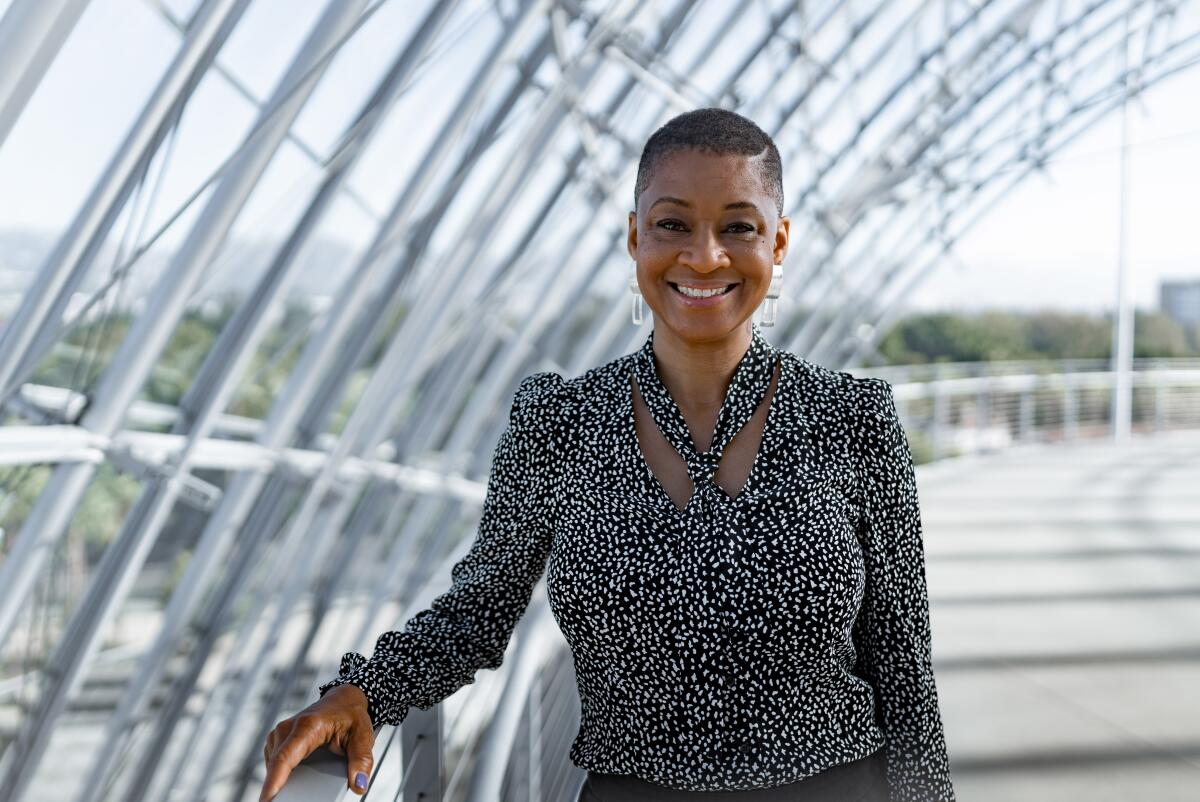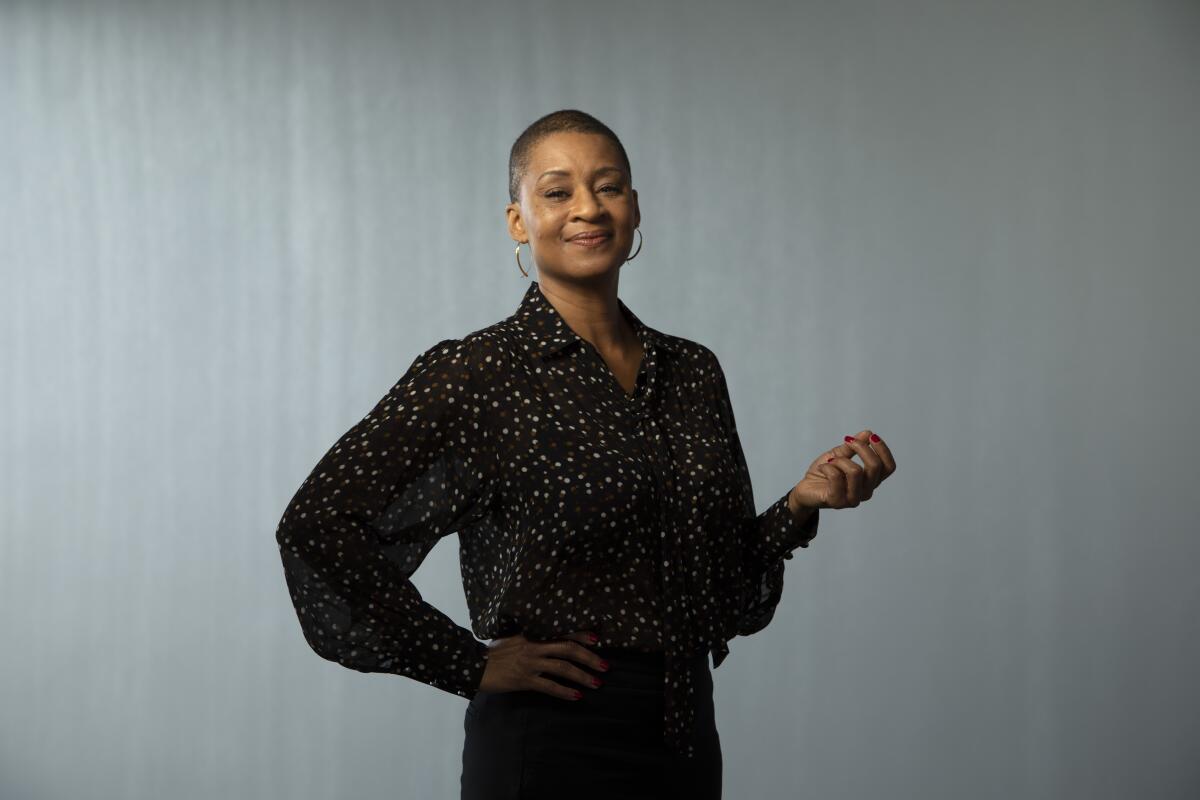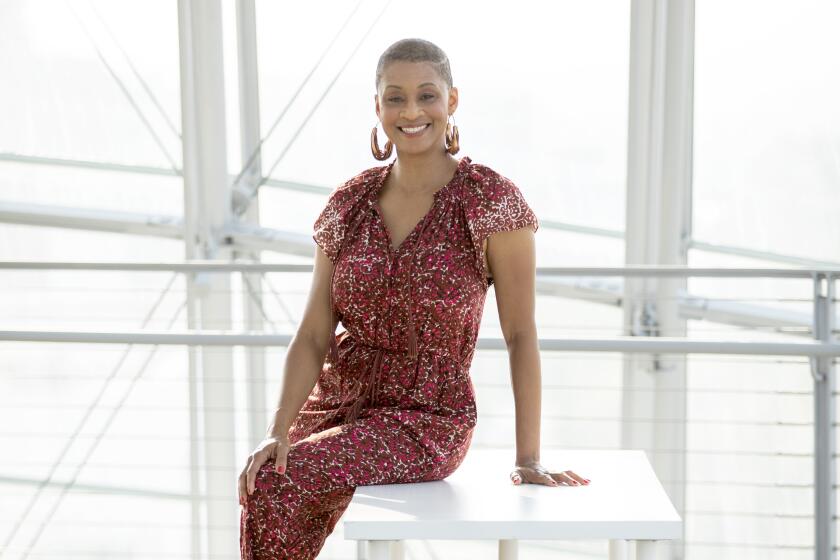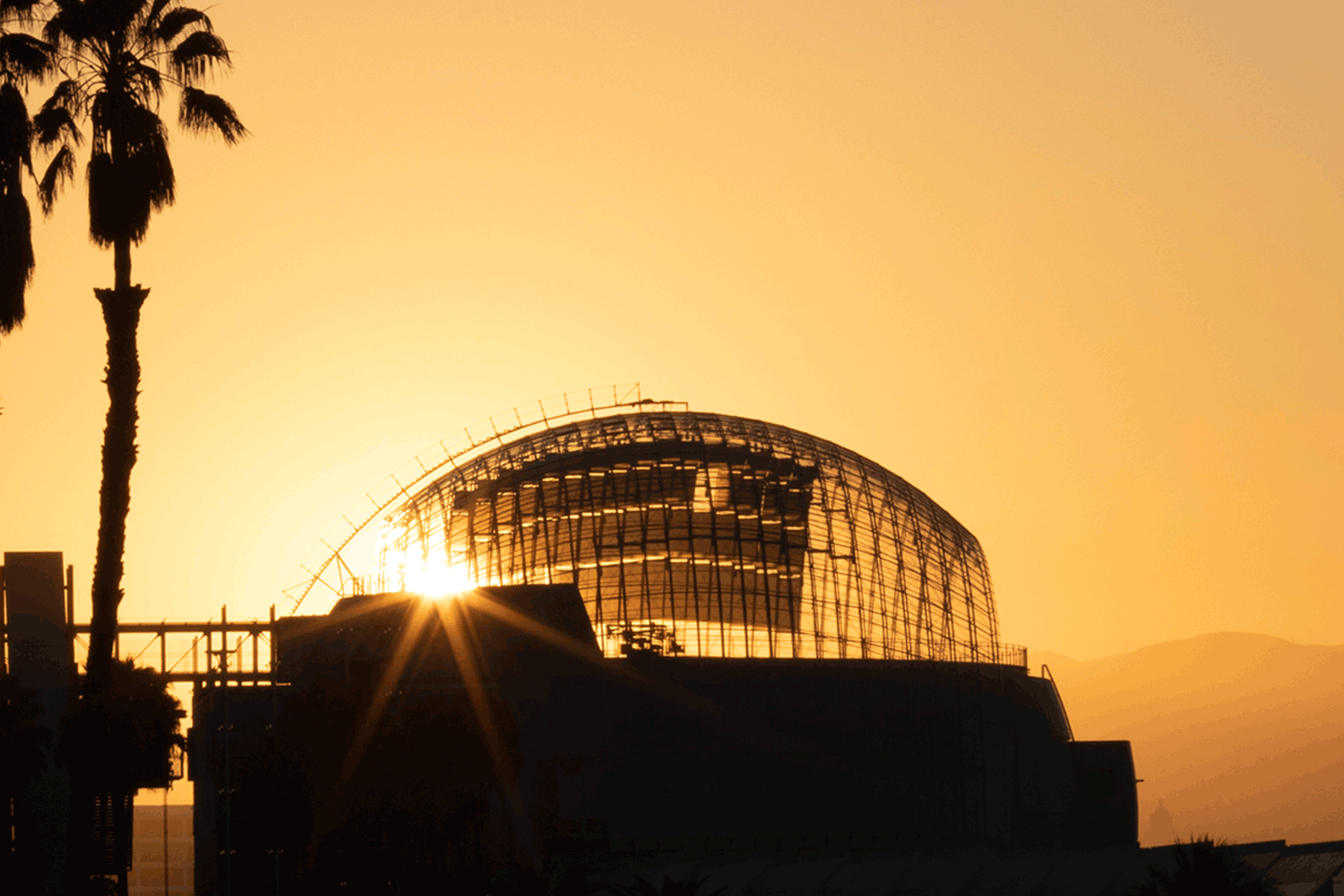MacArthur fellowship for this Academy Museum film scholar brings shock and tears

- Share via
It’s a big week for Jacqueline Stewart, chief artistic and programming officer of the new Academy Museum of Motion Pictures: Not only will she see the museum open its doors to the public, but on Tuesday morning Stewart was named a 2021 MacArthur Fellow — an honor that came out of the blue, she said.
The John D. and Catherine T. MacArthur Foundation recognized the film scholar, archivist and curator for “ensuring that the contributions of overlooked Black filmmakers and communities of spectators have a place in the public imagination.”
“It’s such an incredible honor, and I have just the highest respect and admiration for the people who have received this over the years, some of my true heroes,” Stewart said in an interview, citing photography historian Deborah Willis, art historian and curator Kellie Jones and photographer Dawoud Bey.
Stewart, 51, found out about the award — which comes with a $625,000 “genius” grant to allow fellows the freedom to pursue creative projects — in late August while waiting for an Uber outside the apartment she’d recently moved into after relocating from Chicago. She thought the unknown phone number repeatedly popping up on her screen was a telemarketer.
As the Academy Museum’s chief artistic officer, Jacqueline Stewart will be in charge of screenings and events, giving the past relevance in the present.
When, finally, Stewart answered and the foundation relayed the good news, she was shocked.
“I went completely silent and started crying,” Stewart said. “My ex-husband said: ‘You’re a MacArthur genius!’ He’s been saying for years that it would happen and I never believed him. It was in the category of: ‘I won’t even dare to dream.’”
Once Stewart regained composure, a representative began to read her career biography to her, as is the protocol. It was an especially hot summer day, as she recalls, and Stewart closed her eyes, the sun blazing down on her shoulders, and she just … listened.
“It was really moving,” she said. “I want my work to be impactful and make a difference in the world. It was an incredible feeling to hear and really, really take in that other people valued my work.”
The Academy Museum of Motion Pictures has opened as the ultimate celebration of Hollywood history, Oscar lore and today’s movie makers.
But celebrations are decidedly on hold for now, Stewart said.
“I’ve been so focused on, and consumed with, the Academy Museum opening — that’s taking up all of my time,” she said. “But [the award], it’s a validation that I’m on the right path. Taking on this project is a big step for me, having pursued an academic career and now moving into this museum world.”
Stewart’s body of work, the MacArthur Foundation said in its announcement, “fills critical gaps in the history of American media.”
Put simply: She’s trying to make film history more inclusive.
Toward that end, Stewart’s work has been scholarly and aimed at a broad audience. Prior to joining the Academy Museum, she taught American film history at the University of Chicago, where she’s currently on leave. She authored the 2005 study “Migrating to the Movies: Cinema and Black Urban Modernity,” which the MacArthur Foundation said “paints a nuanced picture of Black spectatorship of the silent screen in Chicago at the time of the Great Migration.” And she co-curated the preservation project series “L.A. Rebellion: Creating a New Black Cinema,” which debuted at UCLA in 2009 as part of the Pacific Standard Time festival. It culminated in a book she co-edited.
On the more public-facing end of the spectrum, Stewart hosts the Turner Classic Movies network’s “Silent Sunday Nights” series. She’s the cable network’s first Black host, discussing the cultural and historical context of silent movies. Stewart’s film preservation project, the South Side Home Movie Project, which she launched in 2005 in Chicago — her hometown — digitizes and screens home movies from the 1920s to the 1980s to illustrate how South Side residents document their own lives and to challenge the way mainstream media represents the neighborhood as a dangerous place.

At the Academy Museum, Stewart oversees exhibitions, programming and education, essentially guiding the “intellectual agenda of the museum,” as she’s told The Times. She aims to draw on her research, teaching and archival work thus far and “three-dimensionalize” it at the museum in exciting, unpredictable programming.
The MacArthur award won’t necessarily shape her work at the Academy Museum, she said, as much as validate it.
“A core part of the work I’m doing at the museum is with the curatorial team and just really emphasizing the importance of deep research and really careful description of film history and the processes of making films,” she said. “And so to me, what I hope this is, actually, is a way of validating the museum side of the Academy Museum, that this helps people to see the intellectual rigor of this museum.”
This year’s 25 MacArthur Fellows — 12 of whom are women and 13 of whom are men — range in age from 32 to 70 and represent the fields of arts, education, science, media and technology, law and environmental studies. Eleven are Black, six are Latinx and one is Asian American. They come from around the U.S., Puerto Rico and Germany.
Four of the fellows, including Stewart, are based in Southern California. Digital media scholar Safiya Noble, 51, an associate professor in the gender studies and African American studies departments at UCLA, was recognized for “highlighting the ways digital technologies and internet architectures magnify racism, sexism, and harmful stereotypes,” the MacArthur Foundation said.
Two Pasadena filmmakers, Cristina Ibarra and Alex Rivera, were recognized separately for individual bodies of work, but they happen to be married — a first for the foundation.
Ibarra, a 49-year-old documentary filmmaker, was recognized for “crafting nuanced narratives about borderland communities, often from the perspective of Chicana and Latina youth.” Rivera, a 48-year-old filmmaker and media artist, received his award for exploring migration, globalization and technology.
Stewart doesn’t have plans for her MacArthur stipend just yet — but space for the unknown is a new and welcome feeling, she said.
“One of the things I love about this recognition is that I don’t have to have a plan right now,” she said. “This is a fellowship where you can use the resources when and however you like — and that’s incredibly liberating. Because as scholars, we never get that luxury of time.”
That the MacArthur award comes just two days before the Academy Museum opens its doors is a little overwhelming, Stewart said, but it’s also a moment of reflection.
“I never feel like I accomplish anything by myself, so it’s really a moment of recognizing the incredible support I’ve always had from my family and my friends and colleagues. It’s an occasion to indicate my gratitude.”
Stewart choked up slightly and paused the interview before continuing.
“My career has been on a fast track from the start,” she said. “From the ramp-up to get a PhD to the striving to get tenure and get promoted and to publish, administrative things that I’ve been invited to do — it’s been very intense. And this feels like a moment to stop and show myself some congratulations, which I never do.”
Now: on to opening a museum.
The full list of 2021 MacArthur Fellows
Hanif Abdurraqib, music critic, essayist and poet
Daniel Alarcón, writer and radio producer
Marcella Alsan, physician-economist
Trevor Bedford, computational virologist
Reginald Dwayne Betts, poet and lawyer
Jordan Casteel, painter
Don Mee Choi, poet and translator
Ibrahim Cissé, biological physicist
Nicole Fleetwood, art historian and curator
Cristina Ibarra, documentary filmmaker
Ibram X. Kendi, American historian and writer
Daniel Lind-Ramos, sculptor and painter
Monica Muñoz Martinez, public historian
Desmond Meade, civil rights activist
Joshua Miele, adaptive technology designer
Michelle Monje, neuroscientist and neuro-oncologist
Safiya Noble, digital media and internet studies scholar
Taylor Perron, geomorphologist
Alex Rivera, filmmaker and media artist
Lisa Schulte Moore, landscape ecologist
Jesse Shapiro, applied microeconomist
Jacqueline Stewart, film scholar, archivist and curator
Keeanga-Yamahtta Taylor, historian and writer
Victor J. Torres, microbiologist
Jawole Willa Jo Zollar, choreographer and dance entrepreneur
More to Read
The biggest entertainment stories
Get our big stories about Hollywood, film, television, music, arts, culture and more right in your inbox as soon as they publish.
You may occasionally receive promotional content from the Los Angeles Times.













